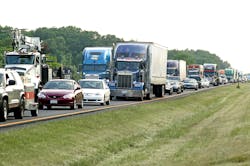As Congress continues to debate a variety of surface transportation funding bills – most notably the two-year Senate sponsored Moving Ahead for Progress in the 21st Century Act (MAP-21) – several groups believe such federal-directed efforts are almost becoming moot as highway funding issues are increasingly “devolving” to the states.
At a briefing on Capitol Hill this week, a panel of experts led by Marc Scriber, land-use and transportation policy analyst with the Competitive Enterprise Institute (CEI), argued that near-default status of the Highway Trust Fund (HTF) due to inadequate fuel tax revenues and policy gridlock at the federal level is increasingly pushing states and localities to figure out ways to generate the funds required to build and maintain U.S. bridges and roads.
“We’ve argued in the past that responsibility for generating highway funds should ‘devolve’ to the states, but now that’s a largely ‘defacto reality’ as declining HTF revenues are forcing the states to look for new ways to generate the monies they need,” Scriber told Fleet Owner.
Scriber said the members of the policy panel – Adrian Moore, Ph.D.,vp-policy with the Reason Foundation; Gabriel Roth, research fellow at the Independent Institute; and Randall O’Toole, senior fellow with the Cato Institute – largely agreed that the federal government should remove itself from the highway funding process and let states take over.
“It’s inherently more efficient for the states to handle this rather than add in the extra step of the federal government collecting and then redistributing fuel taxes,” Scriber pointed out. “Also note that Congress has not increased federal fuel excise tax rates since 1993. Since then, inflation has eroded the buying power of those tax dollars by more than one-third. This has pushed the HTF to the brink of insolvency, yet none of the proposals pending before Congress address this imminent threat to our nation’s surface transportation infrastructure.”
He stressed, too, that as fuel taxes are not providing the necessary funds, new methods must be examined – especially in terms of mileage-use fees. Implementing some sort of mileage-use and time-of-travel fee structure will help address traffic congestion as well, which has significant ramifications for the freight industry, Scriber said.
“Traffic congestion costs commuters some $100 billion per year in wasted fuel, lost working time, etc.,” he explained. “But O’Toole added during our panel discussion what’s not included in that total is the cost of freight delays due to congestion – which he said adds a further $100 billion annually to the overall cost of traffic congestion.”
